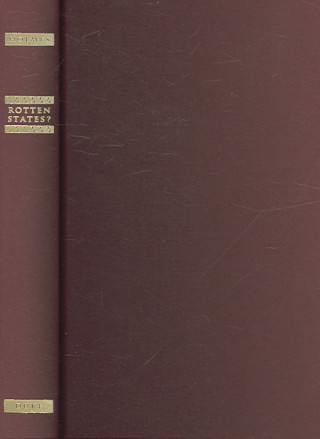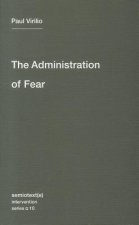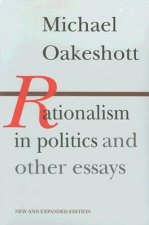
Kód: 04938365
Rotten States?
Autor Leslie Holmes
Official corruption has become increasingly prevalent around the world since the early 1990s. The situation appears to be particularly acute in the post-communist states. Corruption - be it real or perceived - is a major problem w ... celý popis
- Jazyk:
 Angličtina
Angličtina - Vazba: Pevná
- Počet stran: 440
Nakladatelství: Duke University Press, 2006
- Více informací o knize

3923 Kč
Dostupnost:
50 % šance Máme informaci, že by titul mohl být dostupný. Na základě vaší objednávky se ho pokusíme do 6 týdnů zajistit.
Máme informaci, že by titul mohl být dostupný. Na základě vaší objednávky se ho pokusíme do 6 týdnů zajistit.Prohledáme celý svět
Mohlo by se vám také líbit
-

Zapatistas
795 Kč -

Manifesto for the Earth
403 Kč -

River Without Banks
528 Kč -

Antisocial Behavior
6618 Kč -

Book on Love
243 Kč -

East Is a Big Bird
1385 Kč -

BULLARD SCALES ARPEGGIOS BJO BK
759 Kč
Darujte tuto knihu ještě dnes
- Objednejte knihu a zvolte Zaslat jako dárek.
- Obratem obdržíte darovací poukaz na knihu, který můžete ihned předat obdarovanému.
- Knihu zašleme na adresu obdarovaného, o nic se nestaráte.
Informovat o naskladnění knihy
Zadejte do formuláře e-mailovou adresu a jakmile knihu naskladníme, zašleme vám o tom zprávu. Pohlídáme vše za vás.
Více informací o knize Rotten States?
Nákupem získáte 392 bodů
 Anotace knihy
Anotace knihy
Official corruption has become increasingly prevalent around the world since the early 1990s. The situation appears to be particularly acute in the post-communist states. Corruption - be it real or perceived - is a major problem with concrete implications, including a lowered likelihood of foreign investment. In "Rotten States" Leslie Holmes analyzes corruption in post-communist countries, paying particular attention to Bulgaria, Hungary, Poland, Russia, and China, which Holmes argues has produced, through its recent economic liberalization, a system similar to post-communism. As he points out, these countries offer useful comparisons: they vary in terms of size, religious orientation, ethnic homogeneity, and their approaches to and economic success with the transition from communism. Drawing on data including surveys commissioned especially for this study, Holmes examines the causes and consequences of official corruption as well as ways of combating it. He focuses particular attention on the timing of the recent increase in reports of corruption, the relationship between post-communism and corruption, and the interplay between corruption and the de-legitimation and weakening of the state. Holmes argues that the global turn toward neo-liberalism - with its focus on ends over means, flexibility, and a reduced role for the state - has generated corruption in the post-communist states. At the same time, he points out that neo-liberalism is perhaps the single most powerful tool for overcoming the communist legacy, which is an even more significant cause of to corruption in post-communist countries. Among the conclusions that Holmes draws is that a strong democratic state is needed in the early stages of the transition from communism in order to prevent corruption from taking hold.
 Parametry knihy
Parametry knihy
Zařazení knihy Knihy v angličtině Society & social sciences Politics & government Political science & theory
3923 Kč
- Plný název: Rotten States?
- Podnázev: Corruption, Post-communism and Neo-liberalism
- Autor: Leslie Holmes
- Jazyk:
 Angličtina
Angličtina - Vazba: Pevná
- Počet stran: 440
- EAN: 9780822337799
- ISBN: 0822337797
- ID: 04938365
- Nakladatelství: Duke University Press
- Datum vydání: 08. June 2006
Oblíbené z jiného soudku
-

Postmodern Prince
1025 Kč -

The Clash of Civilizations and the Remaking of World Order
286 Kč -

Prince
171 Kč -

Prince
203 Kč -

The Social Contract
185 Kč -

Strategy of Conflict
887 Kč -

Oxford Handbook of Modern Diplomacy
1314 Kč -

On Tyranny
286 Kč -

Captive Mind
357 Kč -

Hope In The Dark
306 Kč -

Common Sense
276 Kč -

Analysis of Robert D. Putnam's Bowling Alone
227 Kč -

The Politics Book
545 Kč -

Anarchism and Other Essays
251 Kč -

How to Run A Government
303 Kč -

Administration of Fear
313 Kč -

Two Books of the Elements of Universal Jurisprudence
360 Kč -

Culture of National Security
1197 Kč -

Conspiracy Theories
265 Kč -

Open Conspiracy
701 Kč -

Oxford Handbook of Political Economy
1257 Kč -

Discourses on Livy
276 Kč -

Coup d'Etat
757 Kč -

Revolutions In Reverse: Essays On Politics, Violence, Art, And Imagination
437 Kč -

Communist Manifesto
302 Kč -

Analysis of Hans J. Morgenthau's Politics Among Nations
227 Kč -

Destined for War
477 Kč -

Dialectic of Enlightenment
751 Kč -

The Principles of Political Economy and Taxation
357 Kč -

Analysis of Max Weber's Politics as a Vocation
254 Kč -

Biggest Secret
484 Kč -

So You Want to Talk About Race
244 Kč -

Divided
276 Kč -

Rationalism in Politics & Other Essays
344 Kč -

Twenty-First Century Socialism
344 Kč -

Price of Inequality
410 Kč -

The Culture of Fear (Revised)
373 Kč -

Oxford Handbook of National Security Intelligence
1869 Kč -

Retrotopia
509 Kč -

Machine Learning For Kids
752 Kč -

Bourgeois Equality
836 Kč -

Fashion and Politics
1318 Kč -

Ronald Reagan
1286 Kč -

States Versus Markets
1365 Kč -

Case for Nationalism
625 Kč -

American Politics: A Very Short Introduction
269 Kč -

Prince - Special Edition with Machiavelli's Description of the Methods of Murder Adopted by Duke Valentino & the Life of Castruccio Castracani
358 Kč -

Chaos and Complexity Theory in World Politics
6638 Kč -

Sovereignty
403 Kč
Osobní odběr Praha, Brno a 12903 dalších
Copyright ©2008-24 nejlevnejsi-knihy.cz Všechna práva vyhrazenaSoukromíCookies


 Vrácení do měsíce
Vrácení do měsíce 571 999 099 (8-15.30h)
571 999 099 (8-15.30h)